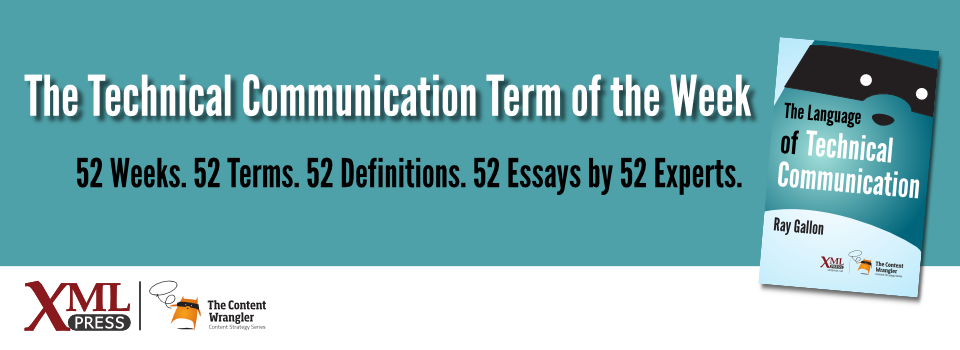As I sat down to write this preface, I had an epiphany: here we have a book of technical communication terminology, and yet the term technical communication is nowhere defined in it! Then I had a second thought: isn’t that so like us? I’ve been in this profession for over 20 years, and I still have family who ask, “So, I’ve never been able to figure out exactly what you do, can you explain it?”
During my tenure on the board of directors of the Society for Technical Communication (STC) we made a decision to stop trying to define the profession and refer to technical communication as a discipline. I think this is the right course. So herewith, I present to you, dear readers, a selected list of terms pertinent to the discipline that we all practice, but that I am not going to define – I’ll leave it to you to answer your own families’ curiosity in your own way.
This book is an example of the joy and the terror of being a technical communicator. We are a varied, multi-talented lot, and we do a huge variety of things, many of which are not in our job descriptions. This means that any list of terms will necessarily contain some exotic notions, and leave out some terms that might be considered essential. Our choices were dictated by two overarching admonitions: that the list not be limited to technical writing, but include all aspects of technical communication; and that the list continue to be valid and applicable into the foreseeable future. Following these prescriptions was challenging and produced at least one editorial crisis, just when we thought we had it all figured out. I believe this book is the better for it.
We are an international team. To start with, Richard and I successfully collaborated, using the nine-hour time difference between California and Europe to keep some tasks going ’round the clock. The contributors also come from both sides of the Atlantic, and represent practitioners in a variety of roles and industries, from different linguistic and cultural backgrounds, an illustration of just how global our discipline is.
This book is also an example of how we practice what we preach. We wrote the terms in a wiki built on a specialized DITA schema, and we practice reuse. Those of you who have read The Language of Content Strategy, another book in this series, will recognize certain terms: content, accessibility, findability, metadata, single sourcing, structured content, content reuse, transclusion, intelligent content, augmented reality, governance model, localization, globalization, and terminology management were all found there. In some cases, they are reused as is, and in others, they have been modified to be more directly applicable to technical communication. In one case, the technology is changing so fast that we wrote a whole new definition. There is so much overlap between content strategy and technical communication that we have also provided an appendix in the form of a glossary, which contains more content strategy terms that we think are essential for a technical communicator.
The job of editor of a collective work is made vastly more enjoyable and – dare I say it – easier when there are first-class contributors. And here, I have to say that we have been more than fortunate. Most of the credit for any success this book may have goes to the 52 experts who authored terms, with sincere gratitude for their skill, their willingness to rewrite and be edited, and the quality of their work.
Having Richard Hamilton as a sidekick has also made this book a joyful process, in both his roles as fellow editor and as publisher. Don Day worked tirelessly, sometimes day and night, to get our wiki up and running, and his openness to our suggestions and his willingness to roll with the punches has also facilitated the cause enormously. And special thanks to Scott Abel, The Content Wrangler, for the opportunity to create this book and for precipitating the editorial crisis that has made it so much better.
All of us offer this book to you in the hope that it will serve you long and well and help to enlarge your horizons.
Ray Gallon
The Transformation Society
http://transformationsociety.net
